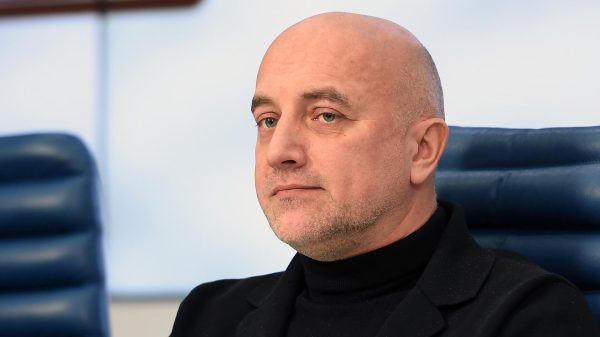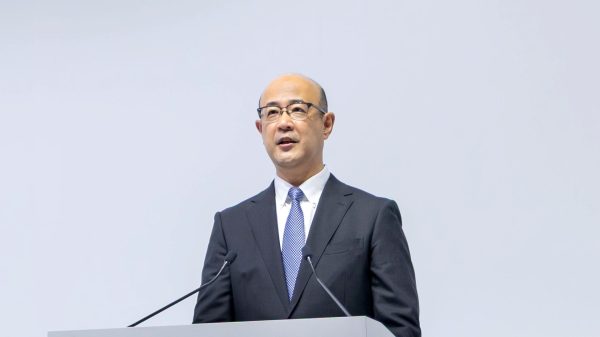 Andrew Strauss led England to number one in the Test rankings by beating India in 2011. Photo: Telegraph Sport/Geoff Pugh
Andrew Strauss led England to number one in the Test rankings by beating India in 2011. Photo: Telegraph Sport/Geoff Pugh
“You lazy bastard. With these words, Sir Andrew Strauss reproaches himself for missing a backhand volley on the padel court.
We're at the posh Hurlingham Club in Fulham. Strauss is not a member, but is preparing for his new project: The Alfred Dunhill Padel Classic. The competition will feature current and former athletes including Strauss, Michael Vaughn, Jimmy Anderson, Andrey Shevchenko and Brian Habana, who will play alongside members of the public.
Unfortunately for Strauss, part of his training involves with me on the padel court. When playing against two professionals, no matter how softly they act, the result is predictable. We are overwhelmed, despite several powerful left hands from Strauss, often marked by punches in the air.
“Come on, partner,” he encourages me as we try in vain to fight our way back into the match. At 47 and 12 years into his professional cricket career, Strauss's competitive spirit has not faded.
“I just hate losing, I really do,” he says. “It’s important to me to have this competitive release. I think when you stop exercising, life can get a little boring. And so to be able to get a little bit of adrenaline and put it on the line is just fantastic.”
Strauss is an accomplished tennis player and is a member of the All England Lawn Tennis Club. – which helped his first padel lessons. “There is a lot of work to be done. But in reality, learning a new sport is a significant challenge, even at my advanced age,” says Strauss.
 Strauss is a skilled racquet player. Photo: Mike Farmer for Telegraph Sport
Strauss is a skilled racquet player. Photo: Mike Farmer for Telegraph Sport  Strauss and Tim Wigmore attacked the padel with gusto, but without much success in their first attempt at partnering. Photo: Mike Farmer, Telegraph Sport
Strauss and Tim Wigmore attacked the padel with gusto, but without much success in their first attempt at partnering. Photo: Mike Farmer, Telegraph Sport
“When you lose, you get a lot of motivation. If you lose, you need to go practice, improve, and figure out where you went wrong. That was my approach to my career: try to never make the same mistake twice.”
Perhaps Strauss' competitiveness can also be found in his assessment of how his England team will perform against today's Buzzballers. Between 2009 and 2011, Strauss' side won six home Test series in a row, drew against a fine South African team, won the Ashes away and then whitewashed India 4-0 to become world number one. Strauss is confident his team will be successful. beat Ben Stokes and company.
“If you look at the teams side by side when we were at our best – we probably had more consistent batting throughout the line-up. And obviously a spin bowler makes a big difference. Jack Leach has done a great job, but he is no Graham Swan.»
 Graham Swan had Strauss bowling attack his X-factor Photo : TOBY MELVILLE/Reuters
Graham Swan had Strauss bowling attack his X-factor Photo : TOBY MELVILLE/Reuters
Asked whether he will really stand by his 2011 vintage, Strauss smiles. «Hey, the game moves forward, so you'll never get a chance to play these matches.»
Despite all the recent exploits of the Stokes team, the Strauss team has a formidable case. They had perhaps the most solid top three in England since the 1950s, with Strauss opening alongside Alastair Cook, supported by Jonathan Trott. The consistency and depth of their batting was such that Matt Prior, who had a Test average of 40.2, was in seventh place, below the averages of Kevin Pietersen and Ian Bell. James Anderson and Stuart Broad have developed into consistently outstanding bowlers. Although England didn't have an all-rounder, Swann had the best spin bowler since Derek Underwood.
«When you only have four bowlers, sometimes the bowler has to bat when things aren't going his way.» his favor. And Swann was able to do it — especially against lefties he was always a threat. He complemented the other bowlers well in controlling the run rate.»
Finding a spinner who can emulate Swann's influence is one of England's most pressing challenges right now. Strauss was encouraged by the performances of Rehan Ahmed, Shoaib Bashir and Tom Hartley in India. “It was a real shot in the arm, very smart decision making regarding selection. But in the end, the Indian spinners outplayed us, which is not surprising.”
 Strauss was encouraged by the performances of Rehan Ahmed and the other two young spinners but says England still have a long way to go. crucial to the Ashes' victory in the 2010/11 season. Strauss doesn't yet have a clear idea of which spinner is most likely to succeed in Australia in the 2025/26 season, but notes that left-arm spinners are stuck.
Strauss was encouraged by the performances of Rehan Ahmed and the other two young spinners but says England still have a long way to go. crucial to the Ashes' victory in the 2010/11 season. Strauss doesn't yet have a clear idea of which spinner is most likely to succeed in Australia in the 2025/26 season, but notes that left-arm spinners are stuck.
“What was surprising was that Nathan Lyon did so well in Australian conditions and Graeme Swann, on his first tour, also performed brilliantly there. Sometimes you think the off-spinners will struggle here, but they actually did well. And left-arm spinners don't always deliver brilliant results.”
For all the differences in style between the 2011 and 2024 sides, Strauss finds one significant similarity. If there are two models of the captain-coach relationship, one offering different perspectives and the other complementing each other, Strauss believes the latter is more effective. As with the partnership between Stokes and Brendon McCullum, Strauss and Andy Flower shared a common vision for the game.
“Alignment of philosophy is critical,” Strauss muses. “Stokes and McCullum seem to be very clear about how to approach things.
“Flower and I had a completely different way of doing it. But again, we agreed.
“The idea there was to play smart cricket and when we were successful we became ruthless. So it was more about containment, about building pressure on the girls bowling. It was about getting a big first serve on the board. It was more traditional old school cricket, but hard cricket.
 Strauss and Andy Flower turned England around in January 2009 year turned into a juggernaut winning machine that stormed to the top of the Test rankings within 30 months. Photo: REUTERS/Philip Brown
Strauss and Andy Flower turned England around in January 2009 year turned into a juggernaut winning machine that stormed to the top of the Test rankings within 30 months. Photo: REUTERS/Philip Brown
“It was very successful for us. Whether it was nearly as watchable as the cricket we watch today is debatable. It's been great watching Stokes, McCullum and this England team because there's always something going on. When you step back and look at the big picture (which you don't often do when you play for England), that's an important element in it all.
“I think the biggest improvement is being positive, being aggressive, and also understanding that when you get to the top, sometimes you just have to push aside the opposition and you don't have to take huge risks. So sometimes it just changes the approach a little bit.”
In the short term, Strauss has no doubt that he will be England's biggest boost. “Wouldn't mind Jofra Archer coming back — just extra pace. I know Mark Wood gives that sometimes, but Jofra is like gold dust. Bowlers like him don't come around very often. So if we can get him playing tests again, that would be a huge step forward.»
For now, Strauss is adjusting to his working life not being centered around English cricket. He stepped down as a strategic adviser to the England and Wales Cricket Board last year, ending an otherwise almost uninterrupted involvement in the game's top echelons since his Test debut in 2004. His only direct involvement in the sport now is as a cricket advisor. Indian Premier League team Rajasthan Royals.
“Frankly, I'm enjoying the break — maybe I've been at the top of English cricket for too long,” he reflects. “I enjoyed my time there, but I feel like there are times when you need to step back and let other people try.”
Will we see Strauss play a major role in the game again? ?
“I’m very happy with where I am now,” he smiles. 'Never say never'
County game reforms 'go nowhere' to help England team.
Sir Andrew Strauss believes England have «got nowhere» in reforms to the county game, which he considers important for the Test team to regularly become the best team in the world.
Strauss, former England Test captain, in 2022 led a controversial high results review which proposed cutting the number of County Championship games from 14 to 10 and cutting the Championship's top division from 10 teams to six. The proposal was rejected by the counties because members were unwilling to agree to a drastic reduction in the number of championship matches, which had previously been reduced from 16 to 14 in 2017.
While praising the leadership of Ben Stokes and Brendon McCullum, England's captain and head coach, Strauss still believes wider changes are needed in the English game if the team is to challenge the world's best teams away from home. Since 2013, England have played 29 Tests in Australia and India, the two best teams in the world, losing 24 matches and winning just two.
 India bounced back to beat England 4-1, extending the team's dismal record of touring against two of the world's best players away from home since 2013. Photo: Manish Swarup
India bounced back to beat England 4-1, extending the team's dismal record of touring against two of the world's best players away from home since 2013. Photo: Manish Swarup
“We just left. nowhere,” Strauss said. “You play half the league matches in April and May in England. So how do you prepare people to perform in Australia or India? This is not true.
“There are certain elements of verification that have been implemented. And I think they lead us to solving the big problems we face in the game. But the truth is that the game we play in first-class cricket is different from Test cricket and everything in the high performance review points to that.
“In this game we have the option to either decide to focus on improving the quality, standard and type of cricket we play in first class cricket or just leave it as is. That's all. It’s not for me to make this decision, it’s a matter of the game.”
Strauss insisted that he would not have done anything differently during the performance review, which prompted an angry reaction from district members.
“I was asked to do a performance review to tell people what needed to happen in to have a meaningful impact on the structure and the way cricket is played,» Strauss said.
«Obviously there is disappointment in the schedule and structure of first-class cricket because I don't feel like we have achieved any progress.
“Ultimately it was the same situation that we see time and time again in English cricket, where there are dual goals and aspirations. So on the one hand, I think the districts really want to support the overall ambition. But secondly, they also think about their place in this world. It is always difficult for leaders and chairmen to lead participants on this journey.”
Strauss firmly believes that The Hundred will benefit from private investment. He suggested that teams selling their entire stake to investors, rather than just a minority stake, could help protect the finances of the game in England. He also warned that without investment, The 100 would face increasing competition from other franchise leagues, including in the US, to attract the best players in the world.
 Sir Andrew Strauss believes The Hundred franchises should be sold to outside investors to fund counties. Photo: Nathan Stirk/ECB via Getty Images
Sir Andrew Strauss believes The Hundred franchises should be sold to outside investors to fund counties. Photo: Nathan Stirk/ECB via Getty Images
«I think this is a worthwhile expedition for the game, and we can't afford not to do it,» Strauss said. “A lot of districts are really struggling financially. And I think The Hundred is a great opportunity to support the game in this country, to really focus on growing this tournament, making it the best short-course tournament in the world. Attracting private investment would be a fantastic boost to the development of this country.
“It's not as good as it could be. And to improve it, further investment in this tournament is needed — more than anything else, to be able to invite the world's best players to play in it again and again. And by the way, keep in mind that this is not just about the growth of the tournament. It's also about ensuring our players don't go elsewhere during the English cricket season to play short cricket, which may well happen in the next couple of years.
“Where would I start? The question is, how do we develop this tournament and maximize that growth, and what model is best for that? I think there's a danger that it becomes a mishmash of: we don't want majority ownership, we want to retain control, etc. And I think if you go down that route, you're limiting the ability for serious investment in the game.»
Sir Andrew Strauss is the executive chairman of TTB Sport Capital, which founded the inaugural Alfred Dunhill Padel Classic, which will take place at Hurlingham on 15-16 May. The competition is held with the support of the Laureus “Sport for Good” Foundation.


























































Свежие комментарии